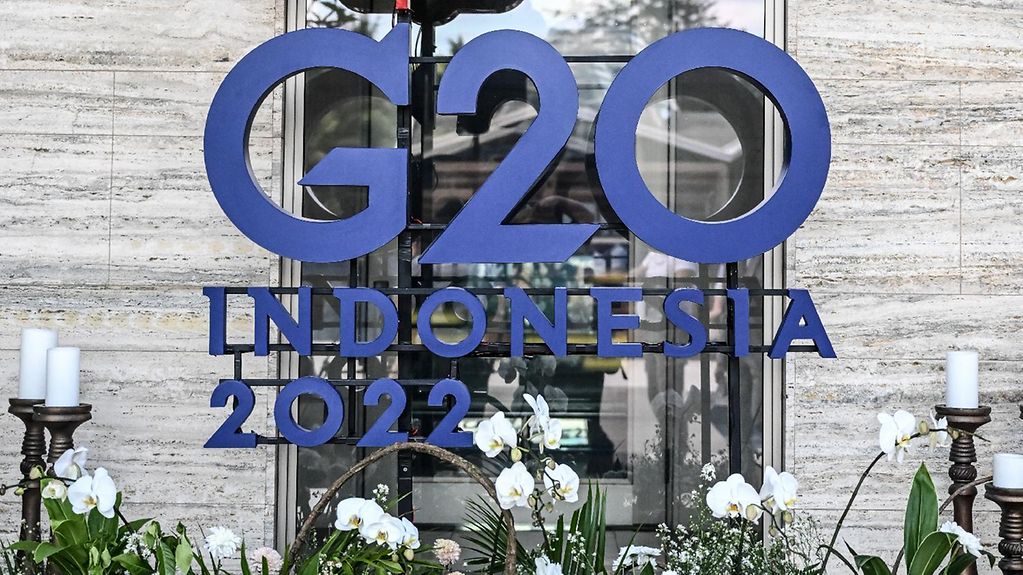FAQ
The 20 leading industrial and emerging nations will be meeting in Bali on 15 and 16 November 2022 for their annual summit. This is not the Olaf Scholz’ first time at such a summit, but it is the first he has attended as Federal Chancellor.
4 min reading time

Ever since its inception, the G20 summit has achieved important results – now the respective heads of state and government are due to meet at a summit in Indonesia.
Photo: picture alliance/dpa
Where will this year’s summit be held?
Indonesia took on the presidency of the G20 on 01 December 2021, so the annual summit from 15 to 16 November 2022 will be held in Bali, Indonesia. Each year, a new member of the group takes on the presidency. India will take over the G20 presidency from Indonesia on 1 December 2022 after which it will pass to Brazil and South Africa.
What is on the agenda?
In line with the motto of the Indonesian Presidency, "Recover Together, Recover Stronger", the G20 leaders will discuss a number of issues in various sessions including:
- Global food security
- Sustainable energy transition
- Global health
- Digital transition
The Federal Chancellor will also be making a clear reference to the Russian war of aggression against Ukraine, which is in violation of international law, and its far-reaching social and economic consequences. As always at such summits, there will also be an opportunity for bilateral talks.
Full information about the G20 Summit in Bali is available on the Indonesian Presidency homepage.
Which countries will participate in the summit?
In addition to the G20 states, the European Union and permanent guest Spain, Indonesia has invited the Netherlands, Singapore, and Ukraine. They will be joined in Bali by representatives of regional alliances such as the African Union (AU), the New Partnership for Africa’s Development (NEPAD), and the Association of Southeast Asian Nations (ASEAN).
Other international organisations also regularly attend G20 summits, including the International Monetary Fund (IMF), the World Bank (WB), the Financial Stability Board (FB), the Organisation for Economic Co-operation and Development (OECD), the World Health Organisation (WHO), the World Trade Organisation (WTO), the International Labour Organisation (ILO), and the United Nations (UN).
Which countries are members of the G20?
The Group of Twenty (G20)’s members are the 19 leading industrial and emerging nations, along with the European Union. The G20 members are: Argentina, Australia, Brazil, China, Germany, France, the United Kingdom, India, Indonesia, Italy, Japan, Canada, Mexico, Russia, Saudi Arabia, South Africa, South Korea, Turkey and the United States of America.
The G20 in numbers: The G20 states currently represent over 80 percent of global GDP, 75 percent of world trade and around 60 percent of the world’s population, in addition to which they also produce 80 percent of global CO2 emissions.
How important is the G20 summit?
The G20 summit is the major international forum in which the leading industrialised countries and emerging economies meet. Rather than being an international organisation, it is an informal body that has no administrative apparatus of its own and no permanent representation, which means that none of the decisions taken at the summits are legally binding. Notwithstanding this, the obligations taken on by its member states involve a significant level of political commitment.
The Federal Government values the G20 as an important forum for coordinating current global issues and challenges. Just how important it is for the G20 partners to communicate with each other and coordinate action plans was made clear by the Russian war of aggression and the COVID-19 pandemic. The same is true of other partners with whom Germany collaborates via other forums.
More information is available at the Federal Foreign Office’s “International collaboration” webpage.
How does the G20 work?
The annual summit of heads of state and government is the most visible element of the G20 process and is organised by the country currently holding the presidency. The issues to be addressed at the summit are prepared by the so-called Sherpas, i.e. the chief negotiators of the respective governments. The Federal Chancellor's personal representative for all G7 and G20 summits is State Secretary Dr Jörg Kukies.
The key outcomes of each G20 summit are published in a series of declarations and communiqués. The summits also produce accompanying reports, initiatives, and action plans, as well as providing opportunities for heads of state and government to meet in person. A selection of summit statements is available at Overview of G7, G8 and G20 summit documents.
What has the G20 achieved so far?
Since its inception, the G20 has achieved some major successes by developing economic policy measures, blazing the trail for global agreements, and providing impetus for national policy. To give just four examples:
- The G20’s coordinated fiscal and monetary policy prevented the escalation of the 2008 global financial crisis.
- The G20 established the so-called BEPS Initiative to combat tax evasion by multinational companies.
- In November 2015, the G20 members committed to ambitious climate protection goals, which paved the way for the Paris Agreement.
- The G20 established their Compact with Africa initiative in 2017 to improve conditions for investment in Africa.
What does Germany want to achieve at the G20 summit?
Germany is committed to supporting a stronger rules-based international order and multilateralism, as well as clear, ambitious responses to serious global problems including, in particular, Russia’s war of aggression, the global economy, food security, climate change, the COVID-19 pandemic, and gender equality, which is why the Federal Government is interested in adopting a dialogue-based collaborative approach with the other G20 partners.
Federal Government reports: Following each G20 summit, the Federal Government reports to the committees of the Bundestag and the general public on the outcomes of the meetings. The Federal Government reports on G7 and G20 summits from previous years are available at Federal Government reports and declarations.